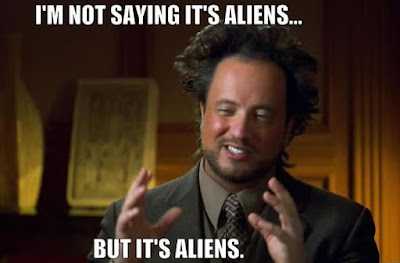While I understand being deeply fascinated with a specific subject, there's a point at which an interest becomes an idée fixe. The result, especially for a scientist, is such a single-minded focus that it can cloud judgment with regards to the strength of the evidence. We've seen that here at Skeptophilia before -- two examples that immediately come to mind are the Sasquatch-hunting geneticist Melba Ketchum and the British proponent of extraterrestrial panspermia, Chandra Wickramasinghe. And the problem is -- for them, at least -- their obsessions have had the effect of completely destroying their credibility in the scientific community.
I can already hear the objections -- that (1) said scientific community is a hidebound, reactionary bunch of sticks-in-the-mud who resist like mad any new ideas, and (2) there are times the mavericks have been vindicated (sometimes after a long and arduous battle to get someone, anyone, to take them seriously). The former can sometimes be true, but almost all scientists are well aware that groundbreaking ideas -- as long as they are supported by adequate evidence -- are how careers are made. Look at the list of Nobel Prizes in the sciences in the past fifty years if you want examples. Virtually all of them were awarded for research that expanded our scientific models dramatically (in some cases, overturned them entirely).
As far as the second -- that sometimes the fringe-dwelling researchers who say "our entire prior understanding of the science is wrong" turn out to be correct -- okay, yeah, it happens, but if you consider the history of scientific paradigm shifts, what will jump out at you is how seldom that actually occurs. The Copernican/Galilean/Keplerian heliocentric theory, Newton's Theory of Gravity, Maxwell's and Faraday's studies of electromagnetism, the Germ Theory of Disease, Einstein's Theories of Relativity, quantum/atomic theory, thermodynamics, Darwin's evolutionary model, Hubble and the Big Bang, the gene as the carrier of inheritance, and the plate tectonic model of Vine and Matthews.
And that's about it, in the last five hundred years.
The point is, we're in a position now where the amount of evidence amassed to support the edifice we call science is so colossal that the "it could all be proven wrong tomorrow" objection I used to hear from my students (especially the lazy ones) is about as close to absurd as you want to get. Sure, there will be some modifications made to science in the future. A few -- probably very few -- will be major revisions. But there's no reason to think that science as it stands is in any way unstable.
And people who come at it with earthshattering claims based on extremely slim evidence are almost certainly wrong.
Which brings us to Avi Loeb.
Loeb is an astrophysicist at Harvard University who has garnered significant notice (and notoriety) in the past few years from his fixation on the extrasolar source of some astronomical objects. (By extrasolar I mean "originating from outside the Solar System.") In 2017 he made headlines by claiming that the oddball astronomical object 'Oumuamua was not only extrasolar -- something fairly certain given its trajectory -- but that it was the remnant of a spacecraft from an intelligent extraterrestrial civilization. Since then, his obsession with extraterrestrials visiting the Solar System has become so intense that it has drawn unfortunate comparisons with this guy:
But (as always) he goes one rather enormous step further, and claims that the meteor it came from was extrasolar, and the concentrations of metals in the beads indicate the object that exploded may have been an alien spacecraft.
Look, I'm as eager as the next Doctor Who aficionado to have a meet-cute with intelligent aliens. (As long as they don't turn out to be Daleks, Sontarans, or Stenza. I do have my boundaries.) Hell, the way things are going down here on Earth, I might even ask to be taken on as a crew member when they leave. But if you're asking me to believe you have bits of an alien spaceship, I'm gonna need more than a few oddball microscopic metal beads.
Extraordinary claims require extraordinary evidence, as Carl Sagan used to put it. And this ain't it.
At the moment, Avi Loeb is increasingly reminding me of a famous character from fiction -- The Boy Who Cried Wolf. I have no problem with Loeb and his friends continuing to search; maybe (to quote a luminary of the field) The Truth Is Out There, and Loeb's dogged determination will eventually pay off. But the problem is, there's a significant chance that (like The Boy in the fable) if he ever actually does find the hard evidence he's looking for, by that time he'll have exhausted people's patience to the point that everyone will have stopped paying attention.
So sorry to rain on the UFOs-and-aliens parade, but me, I don't think we've got anything here but some pieces of a curious metallic meteorite. Worthy of study, no doubt, but as far as what it tells us about extraterrestrial intelligence, the answer seems to be: nothing whatsoever.
****************************************


No comments:
Post a Comment